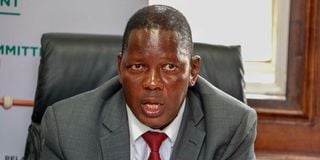
The then Health Cabinet Secretary Mutahi Kagwe addresses some of the Cuban doctors stationed at the Kenyatta University Teaching Referral and Research Hospital (KUTRRH) on August 5, 2020.
| File | Nation Media GroupNews
Premium
Waste of money? Why MPs want Cuban doctors kicked out
What you need to know:
- Kenya entered into a health pact with Cuba, initiating an exchange programme where Cuban doctors would help fill gaps in county hospitals, while Kenyan doctors would be sent to Cuba for specialised training.
- MPs want more local doctors and paramedics employed under the Universal Health Coverage programme.
A parliamentary committee wants the contracts of 100 Cuban doctors terminated.
The doctors have been in the country for the past six years.
The National Assembly's health committee has also inquired about the whereabouts of Kenyan doctors who went to Havana, Cuba in 2017 for an exchange programme under the same agreement.
Kenya entered into a health pact with Cuba, initiating an exchange programme where Cuban doctors would help fill gaps in county hospitals, while Kenyan doctors would be sent to Cuba for specialised training.
The committee, headed by Dr Robert Pukose, recommended that the national government should not renew the contracts of the foreign doctors.
"They have done their job and it's time for them to return home," the committee chairman said during a meeting with the Ministry of Public Health and Professional Standards in Mombasa last Friday.
The committee wants the state to reconsider employing more local doctors and paramedics who are stationed in counties under the Universal Health Coverage (UHC) programme.
The lawmakers said the continued presence of Cuban doctors has put locally trained unemployed doctors at a disadvantage.
"Their salaries are enough to employ at least three Kenyan doctors. Kenyan doctors with expertise in family medicine can fill these roles," said Dr Pukose.

National Assembly Health committee chairperson Robert Pukose on November 1, 2022.
Webuye East MP Martin Wanyonyi, a member of the committee, questioned the economic value of the Cuban doctors' contributions to Kenya's health sector.
But Public Health and Professional Standards Principal Secretary Mary Muthoni defended the presence of Cuban doctors in Kenya, highlighting their significant contributions to family medicine.
"Cuban doctors have played a crucial role in shifting the focus of the country's health system from curative to preventive care," the PS said.
The first batch of Cuban doctors arrived in Nairobi from Havana in 2018, consisting of 53 general practitioners and 47 specialists.
Their contracts were initially for two years, but to date the doctors are still in Kenya.
The Cuban doctors were deployed in various counties including Mandera, Wajir, Isiolo, Lamu and Vihiga, focusing on areas such as nephrology, radiology, orthopaedics, surgery and neurology.
Their mission also included training local specialists to provide standards of care similar to those in Cuba.
However, their arrival sparked controversy when it emerged that they were being paid three times more than their local counterparts. The Cuban specialists were graded at the S entry level.
Their Kenyan counterparts also raised concerns about language and cultural barriers, saying there would be misdiagnosis and under-diagnosis due to language difficulties.
Also Read: Doctors Kenya took to Cuba return home
The then deputy secretary general of the Kenya Medical Practitioners, Pharmacists and Dentists Union (KMPPDU), Chibanzi Mwachonda, said the employment of foreign doctors was in contravention of the World Health Organization's (WHO) global code of practice on national recruitment of health workers.
"We are not jealous, that is a very wrong notion. We are talking about discrimination against Kenyan doctors, resources have been used to train them and now they are not being offered jobs. Discrimination in the sense that they are paid much more than Kenyan doctors," Dr Mwachonda explained.
The then Cabinet Secretary for Health, Sicily Kariuki, said one of the key areas where the doctors' expertise would be focused was on malaria management in eight counties - Kisumu, Bungoma, Kakamega, Siaya, Homa Bay, Vihiga, Busia and Migori - where the prevalence of the disease is over 20 per cent.
Ms Kariuki said this would be done through a malaria vector control project.
"They are not getting huge benefits. They are specialised doctors...in your usual private sector, I would tell you that to get the private doctors at that level of specialisation, the money would be perhaps double or triple what we are paying," she explained at the time.





